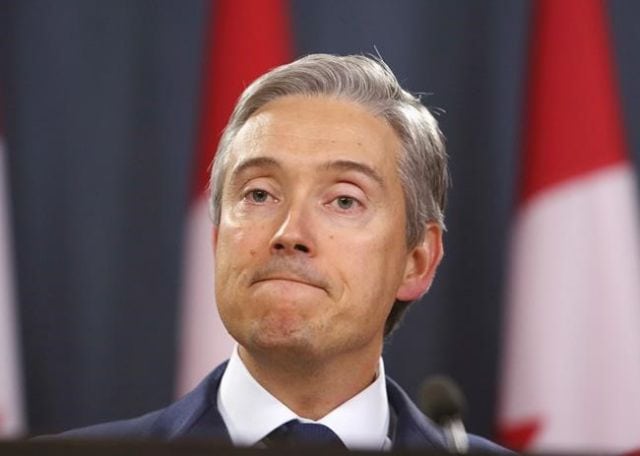
Iran admits to ‘unintentionally’ shooting down Ukrainian plane
Iran state TV, citing the military, says the country “unintentionally” shot down a Ukrainian jetliner because of human error.
The report out of Tehran contradicts a statement from Iran earlier Friday that strongly denied any responsibility for downing Flight 752, and instead blamed it on a fire in the Boeing 737-800’s engine.
The crash Wednesday claimed the lives of 176 people, including 138 who the federal government says were bound for Canada.
Foreign Affairs Minister Francois-Philippe Champagne has said the number of Canadian citizens believed to have been aboard the plane is 57 — not 63 as initially provided by Ukrainian authorities.
Global Affairs Canada officials in Ottawa were not immediately available for comment on the Iran state TV report.
On Thursday, Prime Minister Justin Trudeau said multiple intelligence sources had indicated the plane was downed by an Iranian missile, possibly by accident — an assessment that has been echoed by Britain’s Prime Minister Boris Johnson and Australia’s Scott Morrison.
U.S. Secretary of State Mike Pompeo became the highest-level American official to pin blame on Iran when he made similar comments Friday.
The Canadian government is leading a group of nations that lost citizens in the Tehran plane crash to advocate with “one single voice,” Champagne said.
The government is also creating a task force of top public servants to make sure Canadian families affected by the crash get the support and information they need, Champagne added.
The measures follow private conversations in Toronto between Trudeau and the families of victims who died.
The Canadian Press has independently confirmed at least 74 victims with ties to Canada, many of them students at Canadian universities. The Tehran-Kyiv route has been an inexpensive first leg of a trip from Iran to Canada.
The dead also included citizens of Iran, Ukraine, Sweden, the United Kingdom, Afghanistan and Germany.
The new International Co-ordination and Response Group includes those countries with the exception of Iran and Germany, and Champagne indicated it will focus on sharing information and pressuring Iran to conduct a thorough investigation of the crash.
“Transparency is what the international community is looking for now,” Champagne said, adding: “The world is watching what the Iranian government is doing now.”
Flight 752 went down shortly after Iran launched the missile strikes against the two bases, including one in the northern Iraqi city of Irbil where Canadian special-forces soldiers have been operating for the past five years.
The attack, which did not cause any casualties, was in response to a U.S. airstrike in Baghdad, Iraq, that killed Iranian Maj.-Gen. Qassem Soleimani last week.
Earlier Friday, the head of Iran’s national aviation department, Ali Abedzadeh, told a news conference that “what is obvious for us, and what we can say with certainty, is that no missile hit the plane.” If the U.S. and Canada are sure, he added, they should “show their findings to the world.”
While Western countries may hesitate to share information on such a strike because it comes from highly classified sources, videos verified by The Associated Press appear to show the final seconds of the ill-fated airliner’s flight.
In one video, a fast-moving light can be seen through trees as someone films from the ground. The light appears to be the burning plane, which plummets to the earth as a huge fireball illuminates the landscape.
Iran has invited Ukraine, Canada, France and Boeing, which built the jetliner, to participate in the investigation into the cause of the crash. The Transportation Safety Board issued a statement Friday saying two investigators were preparing to make their way to the area.
“However, the full extent of the TSB’s role in this investigation — including the degree of site access and the type of work to be carried out once at the site or elsewhere — is still being determined,” it added.
Iran is already facing questions about its investigation.
Some of those questions revolved around allegations much of the debris at the crash scene had already been cleared and that the site had not been secured, while others focused on whether Iran would try to evade responsibility if one of its missiles did indeed shoot down the plane.
Asked about those fears, Champagne said: “Over the course of the next few days, we will see if they are genuine.”
The foreign minister added that the immediate priority is getting Canadian officials into the country as Iran has so far only issued two visas. Global Affairs Canada has deployed a team to identify victims’ remains but its members were waiting in Turkey when he spoke.
“Obviously it starts with the visas because until and unless we can have our people physically on the ground, at the site, at the meeting, we are obviously not in a position to have all the influence we want,” Champagne said.
“So we have been stressing to the Iranian government to issue these visas as quickly as possible.”
Iranian authorities said Friday they had recovered the black-box flight recorders from the plane.
Hassan Rezaeifar, the head of the Iranian investigation team, said recovering data from the recorders could take more than a month and that the entire investigation could stretch into next year.
Ukrainian investigators were given access Friday to the flight recorders that were recovered from the wreckage of the plane, which was bound for Kyiv, as well as access to recordings of the air-traffic controllers at the Tehran airport, Ukraine’s Foreign Minister Vadym Prystaiko said.
But while investigators had also been to the crash site, “there are certain pieces that up until this time have not been found or gathered,” he added.
Transport Canada, meanwhile, said it had “issued a notice to Canadian air operators advising them not to enter the airspace of Iraq and Iran due to the potential risk of heightened military activity in the area.”


